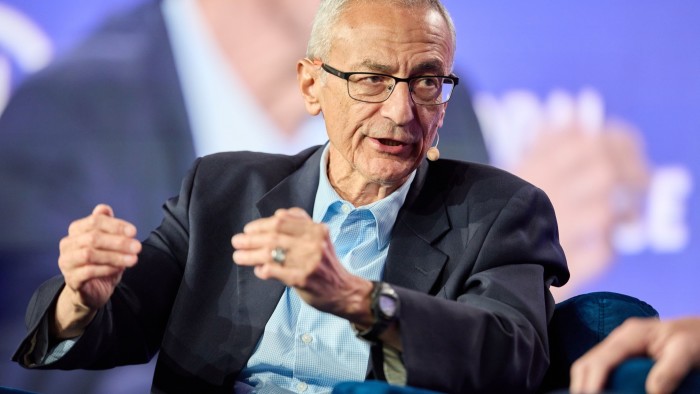Unlock the White House Watch newsletter for free
Your guide to what Trump’s second term means for Washington, business and the world
The gutting of the Biden-era green tech and energy tax credits programme in the US would hurt key Republican states, drive up prices for consumers, hit jobs and “hand[s] a victory” to China, a key architect of the Inflation Reduction Act has warned.
The House of Representatives narrowly passed a sweeping budget bill on Thursday, which includes plans to end clean energy tax credits earlier than expected, undermining a central plank of the signature programme launched under former president Joe Biden.
Former top Biden climate and clean energy adviser John Podesta, who oversaw the development of the 2022 green credits and incentives plan, told the Financial Times Climate and Impact Summit that the Trump administration had “thrown in the towel” on turning the US into a key hub for clean tech and manufacturing.
“At a time where we saw record investment in the sector, record investment in manufacturing, the combination of tariffs, the high debt structure that the Senate has enacted and then the reversal of the Inflation Reduction Act is taking a very, very strong hand and essentially throwing [it away],” he said.
Podesta argued that the IRA had helped drive investment into many Republican held states, citing examples of electric vehicle and battery manufacturing from Georgia to Michigan. He cited research showing $862bn in clean energy investments had been announced in the US since the IRA had passed.
But he warned this investment was now at risk, and compounded the uncertainty faced by businesses dealing with tariffs.
Shares of clean energy companies plummeted on Thursday, after the new spending bill passed with much bigger hits to clean energy incentives than an initial draft that was released on May 12.
The bill will head to the Senate next, where lawmakers could water down its more hardline provisions.
“I think a lot of the members that voted for this bill . . . will have to go back and . . . explain to their constituents that ‘I voted to kill your jobs. I voted to raise your prices’,” as a result of the removal of the support for clean energy, Podesta said. “You know, I think they’re going to have a lot of hard explaining to do.”
The Trump administration launch of tariffs and cuts to green subsidies meant the US had “handed a victory” to China, he said, which was “trying to dominate these industries”.
There was “bipartisan consensus” in the US and in Europe of the need to respond to Chinese dominance of green tech, he added.
“There is an economic security dimension to letting China be completely dominant in these industries. Right now, I think we’ve just thrown in the towel.”
Although China still continues to roll out coal power to meet its growing energy needs, it has also transformed its energy system over the past decade by rolling out renewables and electrifying vast swaths of its economy through cars, battery storage and railways.
It also wields vast power over the markets for the resources and materials that underpin technologies of the future.
The role of China in the global energy shift was also highlighted by Ana Toni, chief executive of the upcoming UN COP30 climate summit in Brazil.
Speaking at the FT Live conference, she said China was a “critical, critical player”, adding that many developing countries had already had “fruitful discussions and trade agreements” with Beijing.
“China has shown that they have a commitment to go faster and go forward despite the geopolitics,” she said. “China has been doing a lot in their own country, but also helping many other developing countries to transition.”
Climate Capital
Where climate change meets business, markets and politics. Explore the FT’s coverage here.
Are you curious about the FT’s environmental sustainability commitments? Find out more about our science-based targets here
